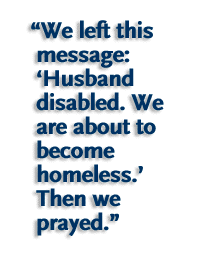 ike millions of Americans, Russell Sjoblom and his family lived in
modest comfort; like millions more, he discovered they were just a few paychecks
away from destitution. An apartment-house superintendent in Matawan, New
Jersey, Sjoblom injured his back moving a refrigerator in January 1994;
he ended up in traction, out of work, and his family slipped to the edge
of despair. A little luck, and a website devoted to people in need, are
all that kept them off the street. ike millions of Americans, Russell Sjoblom and his family lived in
modest comfort; like millions more, he discovered they were just a few paychecks
away from destitution. An apartment-house superintendent in Matawan, New
Jersey, Sjoblom injured his back moving a refrigerator in January 1994;
he ended up in traction, out of work, and his family slipped to the edge
of despair. A little luck, and a website devoted to people in need, are
all that kept them off the street.
"With me unable to work," says Russell, "we quickly fell
behind in our rent and other bills." Medical costs mounted; his wife
was laid off; and eviction notices were taped to their front door. After
seeking emergency assistance from local agencies, Russell's wife, Diane,
used the family computer to look for help on the Internet. "I came
across a website that helped change our lives," she says. "It
was the National Coalition for the Homeless. We left this message: 'Husband
disabled. We are about to become homeless.' Then we prayed."
Help from the NCH's Barbara Duffield enabled Russell, Diane, and their two
children to forestall eviction and then to find a shelter provided by the
local St. Vincent de Paul Society. After the move, Alicia, 12, and Russell
Jr., 10, were threatened with removal from their school because of the change
of address. Duffield came to the rescue again when she informed school officials
that homeless children are protected by a little-known law.
The Sjobloms aren't out of the woods yet, but they're not on the street
either. They have a roof over their heads and moral support from new online
friends. "The Internet is a wonderful tool," says Russell of the
help it's provided. "The whole world is literally at your fingertips." | |



